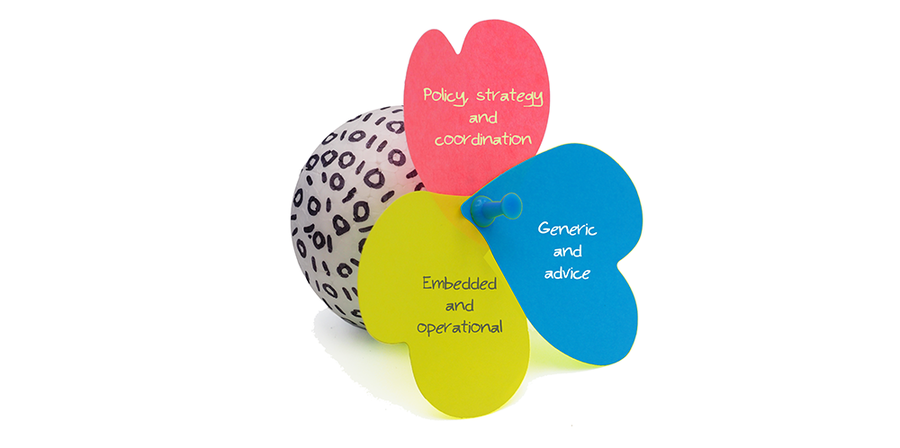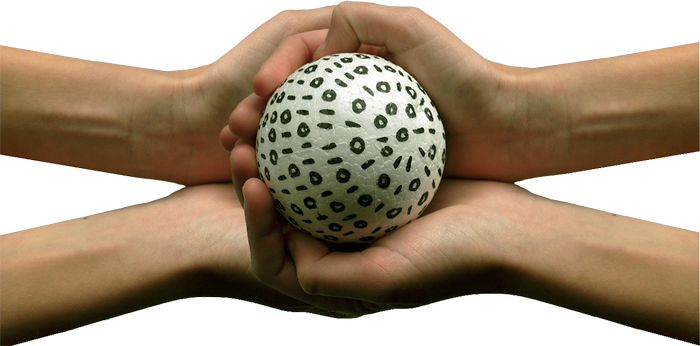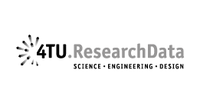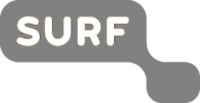The basic assumption is that the researcher [themselves are] primarily responsible for all data. However, the researcher does need professional support to achieve this. To that end, diverse supportive data stewardship roles and functions have evolved in recent years | Verheul, et al., 2019
Data support is an evolving terrain with many flavours. In this section we look at the different workplaces and roles that data supporters or data stewards can have. You can also indicate which way you think you are going.
Flavours of data support
Data supporters or data stewards face the challenge of translating the available infrastructure, tools and data policy into meaningful, tailor-made, discipline-specific advice for storing, managing, archiving and sharing research data. The flavours of data support within an organisation vary considerably. A study by Verheul, et al. (2019) into the tasks and roles of data stewards in Dutch research institutions shows that the variation mainly shows in:
- Job title
Data supporters are called data stewards, data experts, data scientists, data consultants, data librarians, data managers, data management specialist, data stewardship coordinator etc. In addition to their research tasks, researchers may also take on data steward tasks without this being expressed in their job title by itself. - Place within the organisation
A data steward can take a central place (for example at a library or IT department) or can be deployed at faculty level. - Roles and tasks
There are general data stewards, data stewards that are assigned to a certain project (an embedded data steward) and/or that fulfill a discipline-specific role. The general data stewards often have an advisory role, while the embedded or discipline-specific data stewards are also working hands-on in supporting the researcher's workflow. A third category of data stewards has a more strategic or coordinating role. All roles are necessary and the boundaries between the roles are not as strict as the illustration below - based on the classification by Verheul, et al. (2019) - suggests. This is confirmed in Pontika (2019).


In the spotlight
Life sciences data stewardship
The NFU is working its way towards discipline-specific data stewardship. Future life sciences data stewards can use the Handbook for Adequate Natural Data Stewardship (HANDS). It is a living document (NFU, n.d.).
In a project funded by the Dutch research funder ZonMw, a job description and an overview of the knowledge, skills and competencies that a data steward in the life sciences must comply is being developed. The project is called 'Towards a community-endorsed data steward profession description for Life Science research' and has already provided, among other things, a Life sciences data steward function matrix (Scholtens, et al., 2019).
This matrix describes the tasks and responsibilities of the three types of data stewards mentioned in this paragraph in detail. This in turn leads to learning objectives and tailor-made training material. The full description of the project and all its results can be found on the community page of the project on Zenodo (Böhmer, 2019).
A community of data stewards
According to the report by Verheul, et al. (2019) it is important that the different types of data stewards know where to find each other. Essentials 4 Data Support is one of the places where this is possible. In 2014, RDNL formulated its vision on this course as follows:
With this course we mainly aim to offer a community and starting point for data supporters to meet and where they can benefit from each other’s newly gained knowledge and skills. We think that supporting researchers in being responsible for their research data is a team effort. IT staff, library staff, data librarians and data specialists all play their parts. If data supporters know where to find each other, everyone benefits – the researcher in particular | Vision Essentials 4 Data Support, 2014
With Essentials 4 Data Support, RDNL wants to offer - then and now - a shared starting point from which every data steward or data supporter shapes his or her own, unique place. In this course we will mainly use the term data supporter but you can also read data steward.
In chapter VI we will elaborate on shaping data stewardship. But first you will learn more about a number of basic data management topics that researchers may have questions about.

Sources
Click to open/close
Böhmer, J. (2019). Towards a community-endorsed data steward profession description for Life Science research. [Community page ZonMw]. https://zenodo.org/communities/nl-ds-pd-ls/
NFU (n.d.). Handbook for Adequate Natural Data Stewardship (HANDS). https://www.health-ri.nl/services/hands
Pontika, N. (2019). Roles and jobs in the open research scholarly communications environment: analysing job descriptions to predict future trends. LIBER Quarterly, 29(1), 1–20. DOI: http://doi.org/10.18352/lq.10282
Salome Scholtens, Petronella Anbeek, Jasmin Böhmer, Mirjam Brullemans-Spansier, Marije van der Geest, Mijke Jetten, … Celia W G van Gelder. (2019). Life sciences data steward function matrix (Version V1.1). Zenodo. https://doi.org/10.5281/zenodo.2561722
Verheul, I., Imming, M., Ringersma, J., Mordant, A., Ploeg, J.L., Pronk, M. (2019, April 16). Datastewardship op de kaart: Een verkenning van taken en rollen in Nederlandse onderzoeksinstellingen. Zenodo. http://doi.org/10.5281/zenodo.2642066 (Also see https://www.lcrdm.nl/en/rdm-advice-tips for more LCRDM-information about data stewardship)





